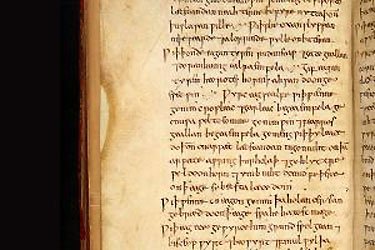
Bald’s Leechbook, British Library (Royal 12 D xvii)).
Scientists recently experimented with a recipe from Bald’s Leechbook aka Medicinale Anglicum an Old English medical text probably compiled in the ninth-century and found that a compound recommended for a common eye infection worked just as well as the modern antibiotic used to treat Methicillin-resistant Staphylococcus aureus (MRSA).
New Scientist:
The project was born when a microbiologist at the University of Nottingham, UK, got talking to an Anglo Saxon scholar. They decided to test a recipe from an Old English medical compendium called Bald’s Leechbook, housed in the British Library. …
Sourcing authentic ingredients was a major challenge, says Freya Harrison, the microbiologist. They had to hope for the best with the leeks and garlic because modern crop varieties are likely to be quite different to ancient ones – even those branded as heritage. For the wine they used an organic vintage from a historic English vineyard.
As “brass vessels” would be hard to sterilise – and expensive – they used glass bottles with squares of brass sheet immersed in the mixture. Bullocks gall was easy, though, as cow’s bile salts are sold as a supplement for people who have had their gall bladders removed.
After nine days of stewing, the potion had killed all the soil bacteria introduced by the leek and garlic. “It was self-sterilising,” says Harrison. “That was the first inkling that this crazy idea just might have some use.”
A side effect was that it made the lab smell of garlic. “It was not unpleasant,” says Harrison. “It’s all edible stuff. Everyone thought we were making lunch.”
The potion was tested on scraps of skin taken from mice infected with methicillin-resistant Staphylococcus aureus. This is an antibiotic-resistant version of the bacteria that causes styes, more commonly known as the hospital superbug MRSA. The potion killed 90 per cent of the bacteria. Vancomycin, the antibiotic generally used for MRSA, killed about the same proportion when it was added to the skin scraps. …
It wouldn’t be the first modern drug to be derived from ancient manuscripts – the widely used antimalarial drug artemisinin was discovered by scouring historical Chinese medical texts.





gonewiththewind
Count me as skeptical. In general medicine and pharmacology when this “drug” was created revolved around superstition and outright fraud/quackery. That some “natural” substance could kill germs isn’t revolutionary, I could list a dozen or so off the top of my head but would consider using one of these in a life or death situation in preference to a modern antibiotic. I’m certainly OK with investigation of something like this but the trend seems to be that the media will hype it far beyond it’s actual value and that the quacks out there will use the hype and natural superstion to bilk millions and even prevent them from seeking lifesaving medical care.
Please Leave a Comment!